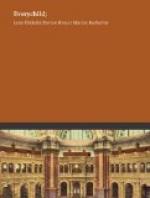She was a large, plain person. Her face was redder than Everychild’s mother’s face, but not so pretty. Her eyes often seemed tired, but never too tired to beam a little.
“Are you all alone, Everychild?” she asked. She did not wait for a reply, but asked another question: “Is something wrong with your kite?” And again without waiting for a reply she added: “Maybe I could fix it for you!”
And she got down on the rug on her knees and took the kite from his hands.
Everychild, standing beside her, looked into her rather sad, kind eyes, which were closer to him than he remembered their ever having been before. There were little moist lines about them, and they were faded. Her hands were not at all like his mother’s hands. Not nearly so nice: and yet how clever they were! She was really untangling the tail of the kite, moving it here and there with large gestures.
And then Everychild forgot all about the kite. Certain amazing things had begun to happen near by.
It had been getting dark in the room; and now it suddenly became quite bright, though no one had turned the lights on. And there was a sound of music—a short bit of a march, which ended all of a sudden. And then Everychild realized that by some strange process two persons had entered the room.
CHAPTER II
EVERYCHILD’S ENCOUNTER WITH THE GIANT
He was almost afraid to look at the two strange persons, because their being there seemed very mysterious, and he had the thought that if he looked at them steadily they might vanish. He knew at once that they were not to be treated just as if they were ordinary persons. It was not only that they had come into the room without making any noise, or that there had been that burst of music, or that the light had brightened.
It was rather because the cook went on untangling the kite, just as if nothing had happened.
He said to himself, “She does not know they are here. She does not know I have seen anything.”
Then it occurred to him that the two strangers were not paying any attention to him at all, and that he might look at them as much as he pleased.
Suddenly he recognized one of them. He had seen his picture. It was Father Time. And he could have laughed to himself because Father Time was a much more pleasing person than he had been in his picture. It is true that he carried a scythe, just as he had been pictured as doing. There was a sand-glass too. It was in two parts, connected by a narrow stem through which the sand was running from one part to the other.
But he did not have a long white beard, and a dark robe, and a stern face. Not at all. His eyes were all ready to twinkle. They were the kindest eyes Everychild had ever seen. You could tell by looking at them that if you were to hurt yourself Father Time would pity you and comfort you. He had a rather jolly figure. You could imagine he might be very playful. And he wore the costume of a jester—though you did not feel like laughing at him, because his eyes were so friendly and kind. He stood as if he were waiting to begin some sort of play.




